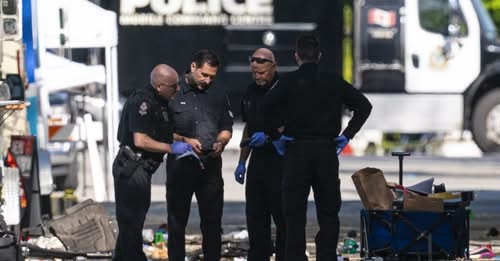A tragedy unfolded that shook the core of a vibrant community, as a black SUV plowed through a joyous crowd of families celebrating Filipino culture. What should have been a day of unity, pride, and tradition turned into a horrific massacre, with 11 people left dead, and many more scarred for life. Among the lives lost was Kira Salim, a beloved teacher whose passion for education and commitment to her students had made a profound impact on everyone she touched.
The scene was meant to be one of laughter, music, and connection. The Filipino cultural festival, which brought together families, friends, and community members, was a celebration of heritage. It was a time to honor the traditions of the Philippines, from the vibrant dances to the delicious foods. Families enjoyed each other’s company in a spirit of solidarity and joy, celebrating their rich cultural history. But as the festival proceeded, a dark force descended upon it. A black SUV, driven by 31-year-old Kai-Ji Adam Lo, tore through the crowd, leaving destruction and death in its wake.
Witnesses recall a chilling moment when Lo, initially bypassing a barricade that had been set up for safety, deliberately accelerated his vehicle into the crowd. Those who were fortunate enough to escape said they could see the driver speeding up, fully aware of the devastation he was causing. The vehicle tore through the festival grounds, indiscriminately mowing down people who were simply there to enjoy a day with their families. It was not a random act of recklessness. It was a calculated attack—an act of violence that turned the lively street into a scene of carnage, bodies strewn across the pavement as horror gripped those who could not escape in time.
As Lo’s SUV continued its rampage, bystanders rushed to take action, desperately trying to stop him. They tackled him, overpowering him before he could escape, but not before leaving 11 dead in his wake, including Kira Salim, a teacher whose life was taken far too soon. Her loss is felt deeply by those who knew her. At her school, colleagues and students alike have spoken out about the impact she had on their lives. She was more than just a teacher; she was a mentor, a guiding light in the classroom. Her students remember her as someone who had an uncanny ability to inspire, to teach not only academic lessons but life lessons as well. She instilled a sense of purpose and hope in the young minds she shaped, and her absence has left an irreplaceable void in the hearts of all who knew her.
In the aftermath, the community is grappling with the loss of their loved ones, and their grief is compounded by the senselessness of the act. The victims of the attack, many of whom were innocent families, are now forever marked by the trauma of that day. The children who survived will carry the weight of witnessing such an unspeakable horror for the rest of their lives. Their sense of safety, already fragile, has been shattered in an instant.
As investigators delve into the background of the attack, it is revealed that the driver, Kai-Ji Adam Lo, had been struggling with significant mental health issues. Authorities have confirmed that this was not an act of terrorism, but rather a tragic event driven by Lo’s ongoing mental health struggles. While this may provide some context for understanding his motivations, it does little to ease the pain felt by the families of the victims. Mental health struggles, though deeply important to address, cannot justify such devastating violence. There is no justification for the lives that were lost that day, no explanation that can make sense of the suffering caused.
The Filipino cultural festival, which had been meant to bring people together and celebrate a rich cultural heritage, has now become the site of unimaginable sorrow. The streets that once echoed with the sounds of music and laughter are now filled with silence and grief. In the wake of this attack, the community is left to heal, and that healing will take time—time to process the loss, time to mourn, and time to begin to rebuild what was broken in a matter of moments.
The families of the victims are left to pick up the pieces, to try to make sense of what happened, and to honor the lives of those they loved. They mourn not only the loss of their loved ones, but the loss of the future that had been stolen from them. For Kira Salim’s students, the loss is especially heartbreaking. They will never get to learn from her again, never get to hear her encouraging words, or feel the warmth of her presence. She had been a guiding light in their lives, but now that light has been extinguished.
The community has come together in the aftermath of the tragedy, showing support for those who are grieving. Memorials have been held in honor of the victims, and the outpouring of love and sympathy has been overwhelming. Despite the darkness that this tragedy has cast, there is a sense of solidarity, a recognition that the community will endure. The memory of those who were lost will live on, not just in the hearts of their families, but in the collective memory of the community that now stands united in the face of unimaginable loss.
As the investigation continues, the world watches, hoping for answers. But even as answers begin to surface, one thing remains painfully clear—lives were lost, and families were shattered. The Filipino cultural festival, a celebration of life, has now become a reminder of how fragile life truly is. And as the healing begins, we are reminded of the importance of community, of love, and of coming together in times of unimaginable sorrow.

Leave a Reply